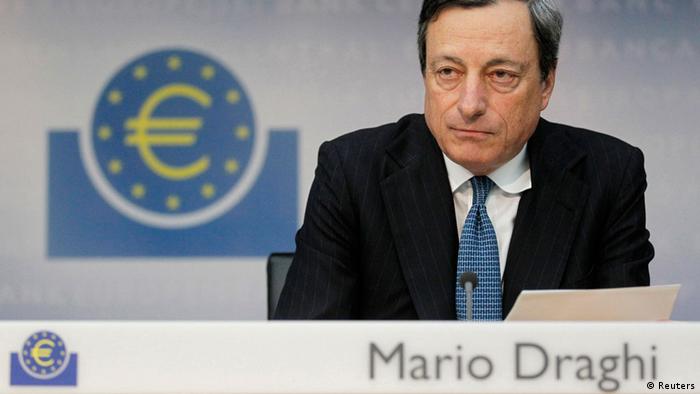The expectations were enormous ahead of the European Central Bank's monthly meeting. People were talking about "unlimited firepower" and "whatever it takes." But the announcements at the end were disappointing.
Not many people were very interested in the fact that the European Central Bank (ECB) left its interest rates unchanged at its meeting on Thursday. Much more important was the question of what the bank was going to do about the high interest rates which some eurozone countries are currently having to pay to borrow money. The ECB president, Mario Draghi, had raised expectations last week when he said that the ECB would do "whatever it takes" to save the euro, "and believe me, it will be enough."
Those were clear words which indicated decisiveness - very different from the usual careful phrases for which central bank presidents are better known. But they left plenty of room for speculation, and so the markets and the media could let their imaginations rip.
Dreams of salvation
One view was that the ECB would start buying bonds itself. But since its statutes don't allow it to lend money directly to states, the idea emerged that the future ESM rescue fund would take over that role. It would get a license to operate as a bank and would have endless credit rights with the ECB, so that it could buy bonds from troubled states. That way it would be possible to reduce the high interest on Spanish or Italian bonds to a bearable level.
That's what the heated imagination of the markets and the media was saying, and it could be that Draghi's imagination was running on the same lines. But on Thursday, reality struck and he had to talk like a normal central banker again. He delivered a sober statement, in coded language, that was disappointingly vague: "The Governing Council, within its mandate to maintain price stability over the medium term and in observance of its independence in determining monetary policy, may undertake outright open market operations of a size adequate to reach its objective."
In other words, the ECB could possibly buy bonds which were on the market. Whether it will do so, Draghi didn't say. The policy is highly controversial. But the ECB has already bought bonds in the past in a program which saw purchases worth some 200 billion euros. That program was suspended in spring.
German resistance
The German representative on the Governing Council of the ECB, Bundesbank president Jens Weidmann, is strictly opposed to such purchases. He argues that the EU treaties do not allow the ECB to finance states through the back door in this way. In addition he fears that pouring so much money into the market would run the risk of boosting inflation. And the prevention of inflation is the ECB's primary task.

Weidmann is the main opponent of an interventionist ECB strategy
Draghi didn't hide the fact that the Germans don't like the idea of buying bonds, but he emphasized several times that he couldn't see any risk of inflation in the foreseeable future. His vague announcement that the bank "may" become active, looks like the compromise on which the bank's council was able to agree.
Draghi has no power to deliver on the other elements in the dream: the bank license for the ESM or its right to buy bonds. So he was only able to appeal to the politicians. "Governments must stand ready to activate the ESM/EFSF in the bond market when exceptional financial market circumstances and risks to financial stability exist," he said, adding that this should only be under strict conditions.
It's up to the governments
One could interpret his words to mean that he too favors a dual strategy from the ECB and the rescue funds. But that won't be decided by the ECB, it will be up to the governments. The German Constitutional Court will also have a say in the matter. On September 12, it's due to announce its decision as to whether the ESM is in accordance with the German constitution. Until then, the fund can't start its operations.

Nobody has yet been able to offer a cure for the crisis
Even if the German government and the German court both agree and give a green light for the ESM, there will still be plenty to do before the fantasies of an ESM with limitless firepower come true. In theory, the ESM, equipped with a bank license, would buy bonds from troubled states, sell them to the ECB and get money with which it could then intervene further. The idea behind the scheme is: if nobody is prepared to lend money to Italy and Spain at sensible rates, then we'll do it ourselves. And we'll do it in such a big way that speculators won't find it worth their while to try to bet against it.
Draghi seems to think that's fine. But here too there is a big gap between fantasy and reality. It's not the ECB but the national governments which have to award the license. The ECB will then have to decide if it wants to accept the rescue fund as a partner and give it credits. Draghi admitted that the ECB has already commissioned a legal report which says that the current structure of the ESM would make it impossible for the ECB to lend it money.
So the big dream of a quick solution to the debt crisis has been followed by the shock of waking up - the dream was never realistic. But the idea of a strategy involving bond purchases by the ESM and the ECB working together is likely to be a topic of discussion and dispute for some time to come. dw de
- Date 02.08.2012
- Author Andreas Becker / mll
- Editor Saroja Coelho
- Share Send Facebook Twitter google+ more
- Feedback: Send us an e-mail. Please include your name and country in your reply.
- Print print this page


No comments:
Post a Comment